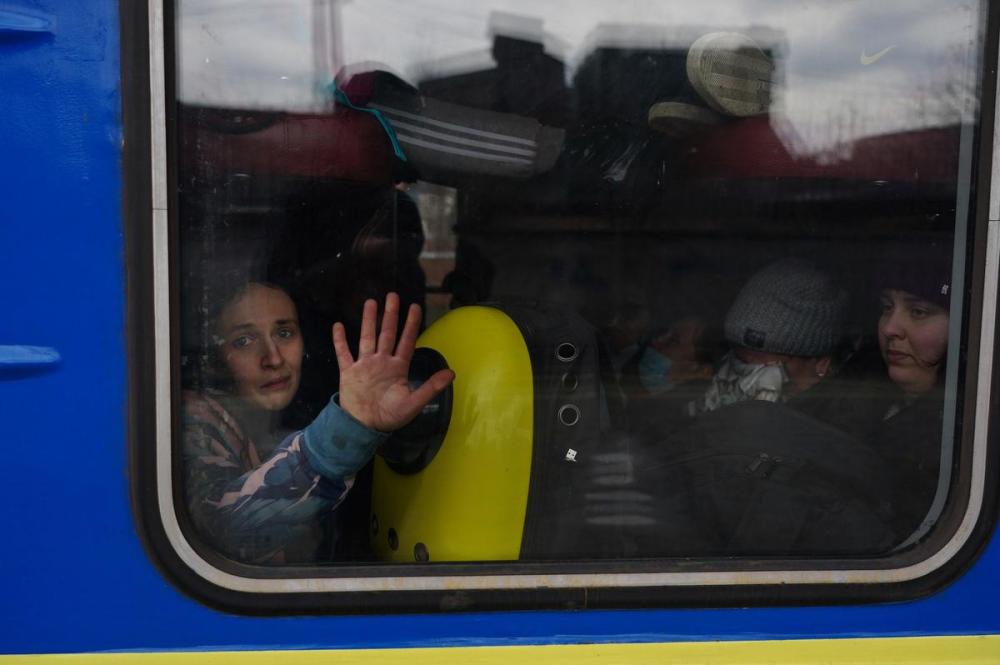The impacts of war are particularly cruel for women and girls
Advertisement
Read this article for free:
or
Already have an account? Log in here »
To continue reading, please subscribe:
Monthly Digital Subscription
$0 for the first 4 weeks*
- Enjoy unlimited reading on winnipegfreepress.com
- Read the E-Edition, our digital replica newspaper
- Access News Break, our award-winning app
- Play interactive puzzles
*No charge for 4 weeks then price increases to the regular rate of $19.00 plus GST every four weeks. Offer available to new and qualified returning subscribers only. Cancel any time.
Monthly Digital Subscription
$4.75/week*
- Enjoy unlimited reading on winnipegfreepress.com
- Read the E-Edition, our digital replica newspaper
- Access News Break, our award-winning app
- Play interactive puzzles
*Billed as $19 plus GST every four weeks. Cancel any time.
To continue reading, please subscribe:
Add Free Press access to your Brandon Sun subscription for only an additional
$1 for the first 4 weeks*
*Your next subscription payment will increase by $1.00 and you will be charged $16.99 plus GST for four weeks. After four weeks, your payment will increase to $23.99 plus GST every four weeks.
Read unlimited articles for free today:
or
Already have an account? Log in here »
Hey there, time traveller!
This article was published 08/03/2022 (1374 days ago), so information in it may no longer be current.
The images emerging from Ukraine are especially stark and painful: large groups of women huddled with their children and babies waiting for assistance, women and children fleeing with their belongings while their partners stay behind to fight, fear mixed with tears brimming in red-rimmed eyes.
“Women feel first-hand the devastating impact that war has on their families and their communities,” said Dunja Mijatović, Commissioner for Human Rights at the Council of Europe in a statement earlier this week.
“Amidst the fighting and violence surrounding them, Ukrainian women have been taking care of their families and neighbours, with many of them having travelled over long distances to bring their children and their friends’ children to safety.”

The devastating scenes are a reminder of the particular impacts of war and conflict on women and girls — not just in Ukraine, but around the world.
“This year International Women’s Day falls as armed conflict in Europe plunges the world into renewed crisis,” reads a release issued on Monday from Amnesty International. “Images of women giving birth while sheltering from airstrikes; of women fleeing the bombs — children in their arms; of grieving mothers; of newly orphaned children, underscore just what conflict and humanitarian crisis mean for women and children. The women and girls caught up in the conflict in Ukraine now join the ranks of millions more who have suffered the unrelenting human costs of armed conflict from Syria to Yemen and Afghanistan and far beyond.”
Even before Russia’s attack on Ukraine, which is leading to what is being described as the largest movement of refugees in Europe since the Second World War, the number of forcibly displaced people worldwide has been growing at an alarming rate.
In 2010, 1 in 159 people in the world were forcibly displaced; in 2020, the number was 1 in 95, nearly 1 per cent of the world’s population, representing over 82 million people.
Women and girls make up half of the world’s displaced people, categorized as refugees, those who are stateless, and/or those who are internally displaced. According to the United Nations Refugee Agency (UNHCR), women who are unaccompanied, pregnant, disabled or elderly, and those who remain as heads of households are even more vulnerable.
Yet, women and girls have historically received little targeted support or assistance. According to an analysis by UN Women from 2014, only 4 per cent of the UN’s interagency efforts to address humanitarian crises were aimed toward this group. This, despite ample evidence that gender inequalities are exacerbated during times of crises.
Fast-forward to today as the world continues to struggle with the fallout of a global pandemic. The situation is far from improved.
As a 2020 report from the UNHCR notes: “[ …] COVID-19’s impact has gone far beyond health and has driven millions of refugees into deeper poverty and despair. Often reliant on daily wage jobs or informal employment, they were among the first to lose out in lockdowns, with poverty rates amongst refugees soaring. And the consequences have been grave, especially for women and children. Gender-based violence has increased, as has domestic violence and early child marriage. Refugee children, especially girls, were already less likely to attend school than their host counterparts, had less access to remote learning opportunities, and are less likely to return to school after the pandemic.”
Canada has taken steps toward supporting the empowerment and advancement of women and girls through its Feminist International Assistance Policy, but more long-term investments will be required given the magnitude of the challenges ahead.
Without gender equality, the scars of war will only deepen.
Amira Elghawaby is an Ottawa-based human rights advocate and a freelance contributing columnist for the Star.


